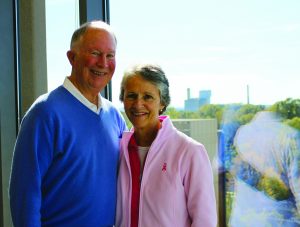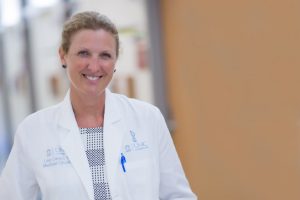When a loved one is diagnosed with cancer, family members and friends seek the best help they can find, whether it’s a doctor, a hospital or an institution. Tom and Nancy Chewning did just that when their daughter, Wilson Steele, was diagnosed with breast cancer in 2013.

The family sought out UNC Lineberger’s Lisa Carey, MD, FASCO, the Richardson and Marilyn Jacobs Preyer Distinguished Professor in Breast Cancer Research and physician-in-chief of the North Carolina Cancer Hospital. When the Chewnings were looking for the best, they found it in Carey.
Discussing their daughter’s care, the couple knew they had found something special, as they talked through the options available to Steele and went over treatment possibilities with Carey. The Chewnings heard more than just a doctor talking about a patient, they heard a physician-scientist looking for answers.
“It planted a notion in our mind, that [Carey] was not just a clinician but was interested in anything that could help her patients, and research was something that had to go on,” Tom Chewning said. “I realized she wasn’t a researcher for research’s sake, she was a researcher who was trying to use whatever was found as a better solution for her patients.”
“She has risen to the top in the world, and she is so well respected,” Nancy Chewning said. “She’s approachable and caring about patients and families.”
Funding far-reaching breast cancer research

Carey’s work with breast cancer has impacted a huge number of patients both in North Carolina and across the world, and she recently was awarded an RO1 grant, a financial award that recognizes the best in clinical research. Leading up to the RO1 grant award, Carey had to make proven strides in breast cancer research, something the Chewnings wanted to support financially.
With a very personal stake in Carey’s research outcomes, the couple opted to make a $1 million gift to UNC Lineberger in 2015 to support the Dr. Lisa Carey Fund for Breast Cancer Innovations. These funds allowed Carey to broaden her research into breast cancer to help more patients, attracting new investments like the RO1.
“The RO1 is a great achievement and hallmark of dedication and research success, something that wouldn’t have been possible without early support by donors like Tom and Nancy Chewning,” Carey said. “All the work we’ve been able to do with their gift has helped us move ahead, proved that we were on the right track, and has brought us to a place where this may be translated to significant difference in the lives of patients and their families.”
The Chewnings had those patients and their families in mind even while they helped their daughter through her cancer journey and wanted to make sure others saw the benefits of their gift. They placed their full confidence in Carey and have been pleased with the work being done.
“Many people are research oriented, but they don’t get to the translational point,” Tom Chewning said. “We weren’t after a breakthrough unless it could be translated into a difference in the way patients were treated and improvement in the results.”
“We believe in her product,” Nancy Chewning said. “It’s personal for us. We can’t say enough: If she can find the cutting edge, new research project to benefit patients, how great is that!”
Patient care and support
Having experienced the cancer journey from a parent’s perspective, the Chewnings know how important it is for patients and their families to have a clear understanding of what’s happening and more importantly, the resources available to them.
“Every patient that comes through our doors is treated with respect and care for their wellbeing, but we want to make sure their care doesn’t end once they leave our clinics,” Carey said. “One way they receive support outside of our clinics is through patient navigation programs that help them through their cancer journeys. By supporting these types of programs, our patients get the best care, both in the clinics and at home with their families.”
Tom Chewning remembered long days spent at the hospital and observing what other patients were going through. He recalled seeing patients that had traveled long distances to get to the N.C. Cancer Hospital and others who had left jobs and responsibilities to receive care. He said he was impressed by Carey’s awareness of those issues and was glad to see funds from their gift going to help pay for conveniences like parking and gas cards.
A lasting partnership
The Chewnings have continued to support Carey’s work and UNC Lineberger during the past four years, and they have full confidence in the researchers, physicians and staff providing patient care and seeking answers to cancer questions.
“No matter what comes of the latest research, I know there’ll be more information that will lead to a better outcome for cancer patients, and particularly breast cancer patients, if [cancer] returns,” Tom Chewning said.
“I just thank God for six years cancer-free, and we can thank Lisa and her team” Nancy Chewning said of her daughter’s health. “We also don’t have the spirit of fear about it. If [the cancer] were to come back, it would be treated not like a terminal disease but a chronic illness.”
The Chewnings’ outlook remains optimistic, and they see their gifts as investments in a better future for their daughter and other patients just like her.
“If you invest in UNC Lineberger, you’ve got a culture, a network, credibility and assets that can make good returns on these investments,” Tom Chewning said. “When Lineberger has a breakthrough, it will benefit so many more people. For those who want to benefit their fellow human beings, this is a place where that investment can be a good one.”
